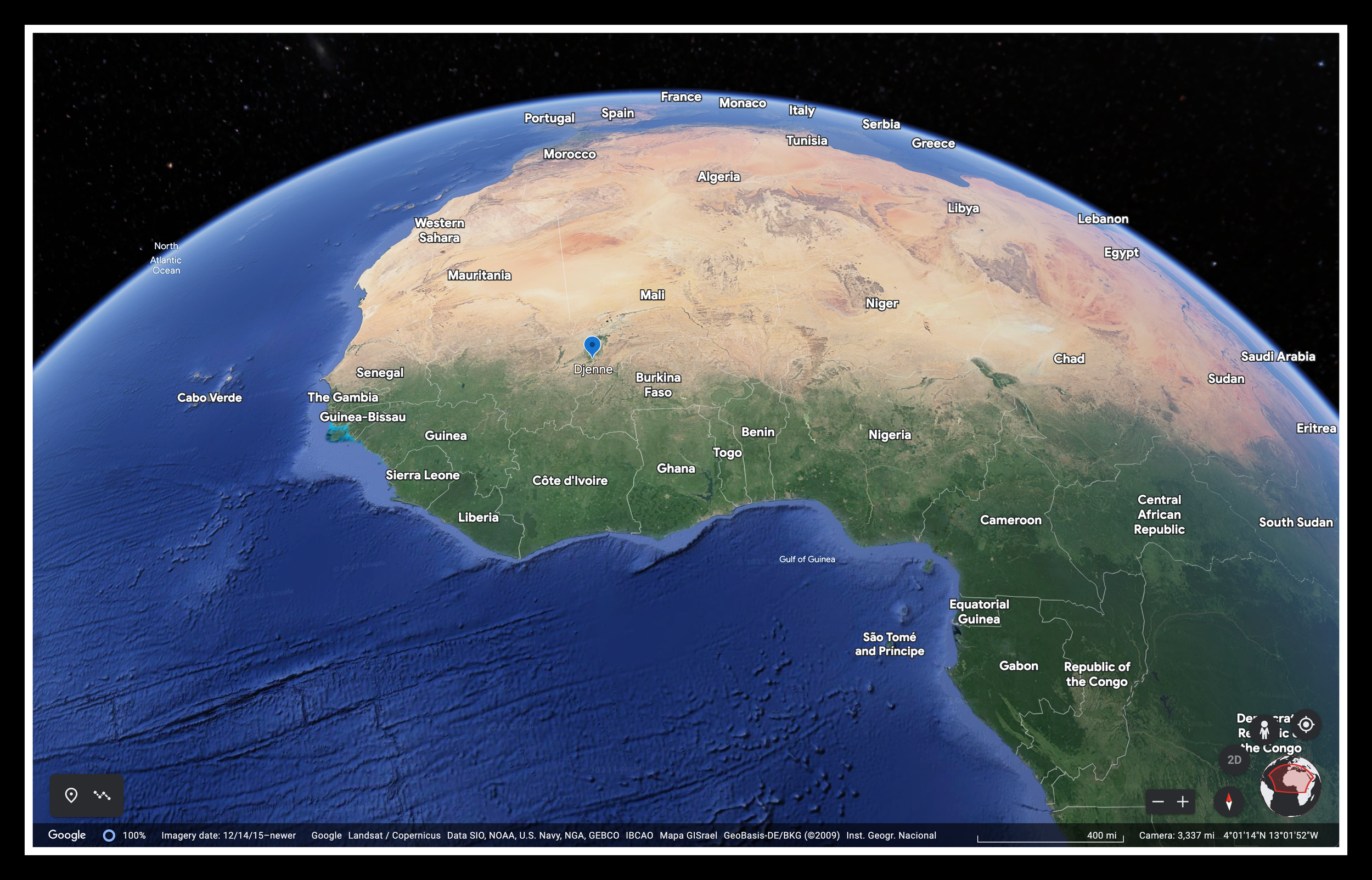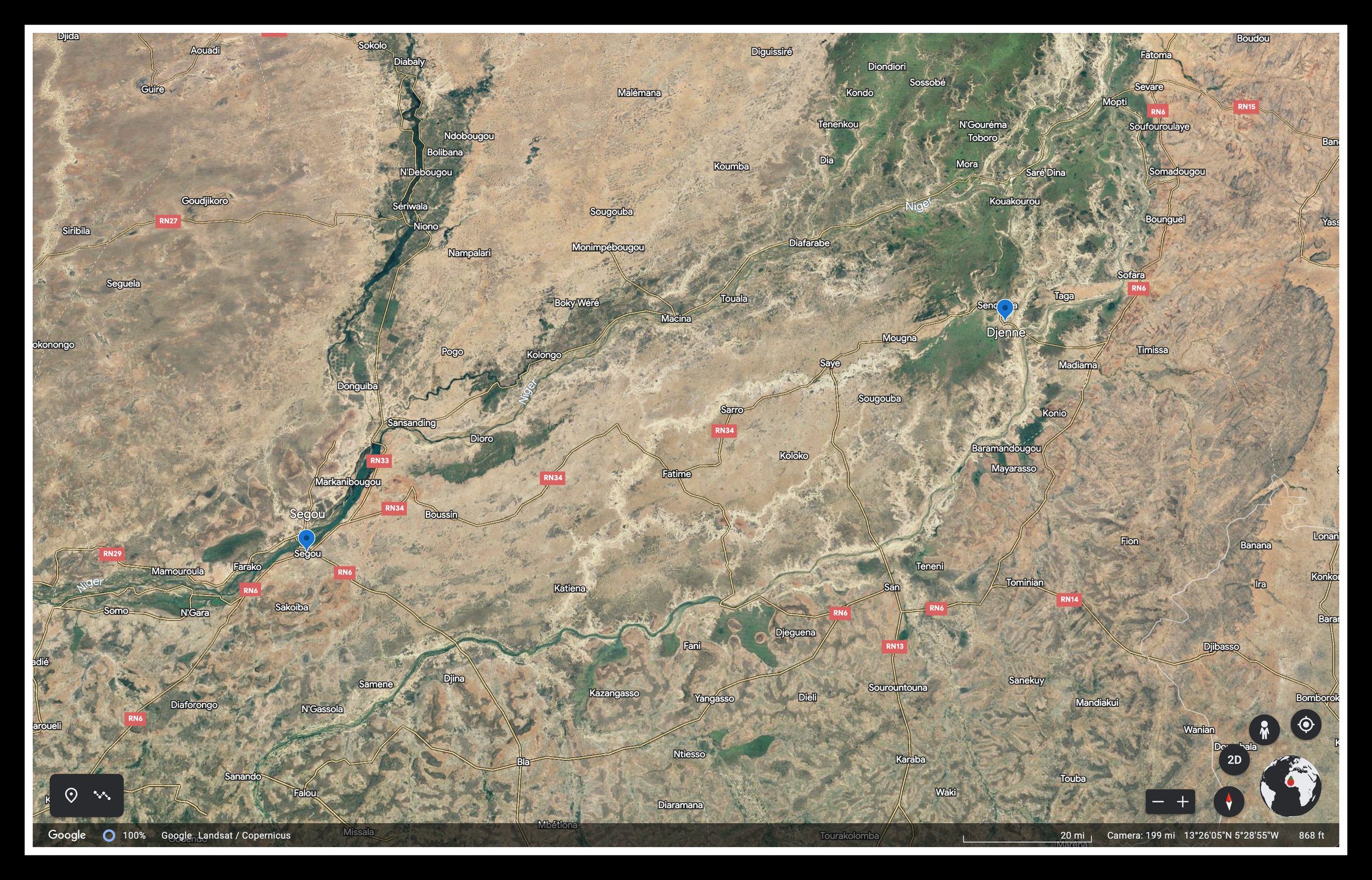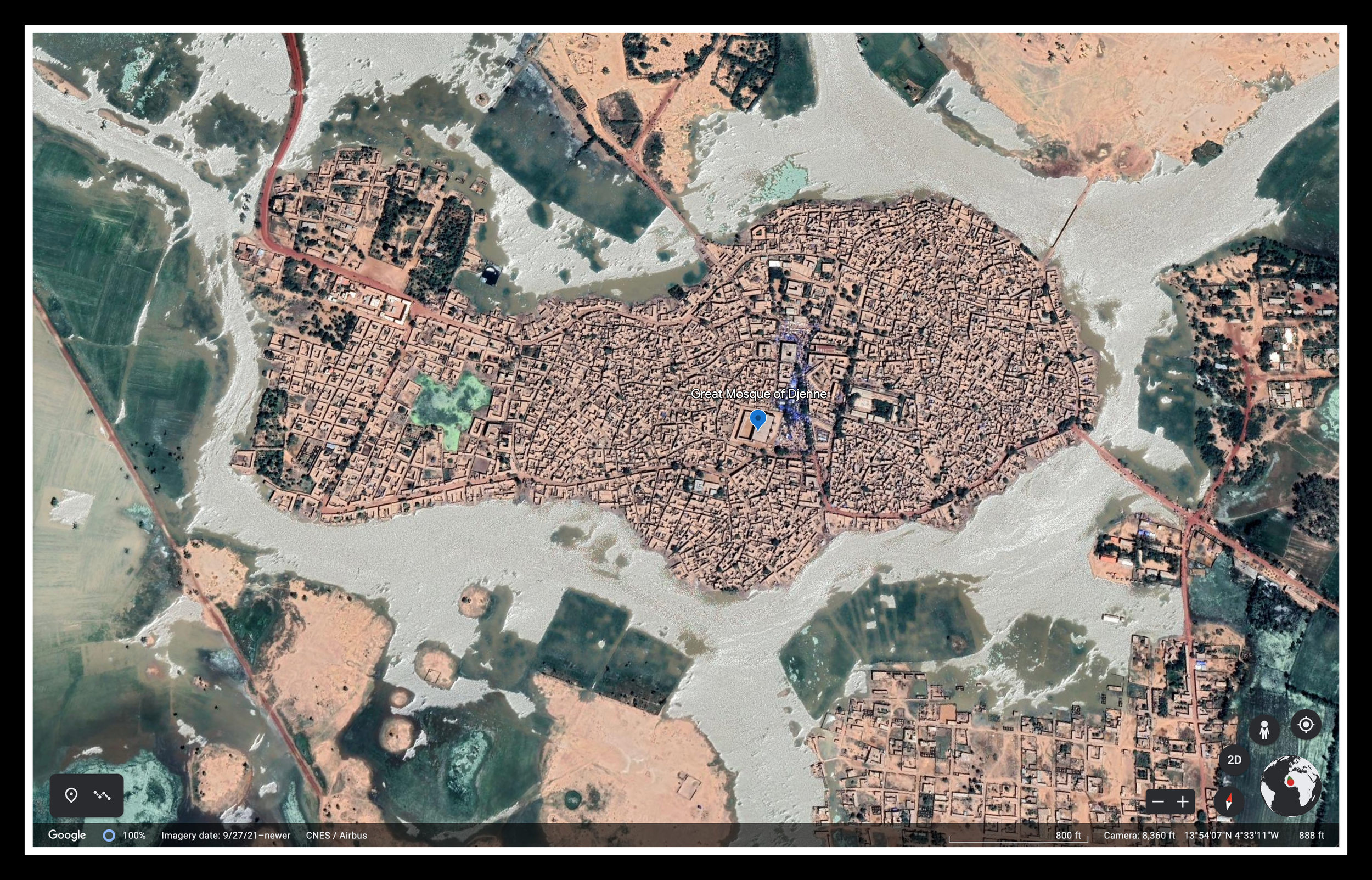193 - Peter Pan & The Mud Brick Mosque (Djenne, Mali)
WE HIRED A TAXI FROM SEGOU TO DJENNE… WE THOUGHT. Take us all the way to Djenne? Don’t be fucking ridiculous. “Segou to Djenne” meant Segou to the ferry landing four kilometers from Djenne… duh. I was not amused, and even less so when a gentleman working on the boat extorted 500 CFA from us for passage on the “free” ferry. Had it not been for an archeological student from Rice University and her crew, my inner asshole would’ve blossomed. She had to live and work in Djenne. I didn’t want to jeopardize the crew's good standing.
It wasn’t the money (a mere $1), it was the “pay us or get off the fucking boat” attitude that nearly sent me into hissy. The ride is free because there’s no other way to Djenne. Presentation is everything. Had they exhibited a modicum of politeness, I doubt my dander would’ve flown wide open. They weren't just impolite, they were downright threatening. Fuckers.
“Djenne's UNESCO World Heritage-listed old town, which sits on an island in the Bani River, is one of our favorite places in Mali, not to mention one of Africa's oldest towns.’”
That’s how Djenne's description began in the Lonely Planet. You'd think by then I would’ve been an expert at discarding superficial expectations. Don't get me wrong, if you go to Mali, it’s well worth the trip, just not for the reasons you might expect.
We found our overpriced hotel, dropped our bags inside a room not dissimilar to a mental ward cell, and ate an overpriced lunch. Yum. (It’s a sad reality, but tourism has tainted Mali’s allure beyond repair… frown. Again, blame affluent French tourists on inflated package deals.) Enter Sori. He’d been waiting in ambush. The man who’d arranged our taxi from Segou alerted his friend to our impending arrival. Sori turned out to be a decent fella, someone I was happy to meet.
Djenne is dominated by the central square containing the Great Mosque of Djenne, composed almost entirely of mud bricks and wooden spars. The mosque is the largest adobe building in the world. The current structure dates from 1907. It’s a wonder to behold, although “supremely elegant” might be pushing it. When I hear “supremely elegant,” I think of a high-priced hooker, not a sacred UNESCO site. “Elegance” comes at a price. Mud brick isn’t known for longevity, so every year after the rains, the mosque must be repaired. People from the surrounding area come together to assist with improvements. The wooden spars you see jutting from the structure not only provide support but also aid in reconstruction efforts, serving as a scaffolding. Mosque repair has taken on a pilgrimage quality.
Roasting peanuts the old fashion way.
Can you say law of unintended consequences? The Aga Khan Development Network, responsible for helping to preserve not just the mosque, but many of Djenne's unique architectural and cultural sites, created a longer-lasting mud. Better mud means a stronger mosque, a mosque that only requires major repair every few years. Sounds great right? Wrong. The repair isn’t just a ritual, but a tangible exercise of devotion and faith. And in a place where hope and despair are close neighbors, faith can be the difference between perseverance and resignation. So, people weren’t so enthused when they learned services wouldn’t be needed every season. For the folks in this region, it’s a little like telling Muslims the Hajj will be held bi-annually.
Non-Muslims aren’t allowed entry… unless they pay for the privilege. I'd read about the phenomenon but was still shocked when someone offered to lead us inside for $20 US. I was as taken aback as much by the indecent offer as I was by the paltry sum. Really? You'd lead an infidel into your most sacred of sanctuaries for twenty bucks? I might’ve been a dipshit tourist, but even I wouldn’t go there. Some do. I could only imagine how that was perceived by more devout members of the community. I love a good riot as much as the next guy, but…
In the evening, we strolled aimlessly in the area near the mosque, struck by the presence of so many children. They were everywhere. This site is not uncommon in Mali or elsewhere in the developing world, but there was something particularly striking about Djenne in the dying light. We found ourselves surrounded by rugrats far too young (by our standards) to be patrolling the streets without adult supervision. Had Peter Pan become mayor, imposing a regulation forbidding anyone to grow up? It’s difficult to describe the surreality attached to watching toddlers wander alone or in small groups led by a weathered and crusty four-year-old. Amazing. Compelling. Heartbreaking.
A visiting Peace Corps volunteer working in Cameroon told us the situation was similar there. In Mali, like Cameroon, most women don’t want a lot of children but are forced to submit to the will of their husbands. Children are a sign of prosperity and standing. Birth control isn’t an option. And, as our guide in Dogon Country would later tell us, “Children are cheap.” Um, ‘kay. Did you say chickens or children? Cheap and easy. Poop out as many as you can. It’s no trouble. They practically take care of themselves.
Sori pointed out houses where boys go to live when they turn seven or so, staying until they find a wife and create a family of their own. This takes some of the burden off the household and fosters independence. For their part, I was told the boys love it. Many paint the mud outside their place with all kinds of bright colors and listen to loud music. Sounds awesome. (Sarcasm alert.) I’d have to imagine it also means they start working at a young age. So much for Peter Pan. And so concluded our first night in Djenne…
“When I made the transportation arrangements, I was under the impression I’d board the taxi in Segou and exit in D’Jenne. Instead, we were dropped off on the opposite side of the river and told to board a ferry. Once we made it across, we would need to hitchhike or hire a taxi to take us the last 4km. Awesome. That’s just what I wanted to hear after selling my left kidney for the ride.
The ferry operator charges a small fee for cars, but it’s free to passengers, or at least that’s the way it’s supposed to be. Within minutes we were asked for money. I suppose you could say the theme of the day was, ‘Leslie and Rich get screwed’, because when we challenged the request, we were told to get off. I wanted to grab our things and go, just to prove a point, but seeing as how we’d have to hire a pirogue instead, I buckled. I was short on change, so he settled for less, which made me feel a little better about the situation; only a little, though.
While on the ferry, we struck up a conversation with an American student by the name of Gaby. She’s from the Midwest, but spending several months in Mali, studying the archeological site of Jenne-Jeno. She was nice enough to give us a lift and offer some insight on the area – thank you, thank you, wherever you are.
D’Jenne is an interesting place. It’s well known for its unique architecture and grand mosque, which happens to be the world’s largest mud-built structure. The town is considered one of the oldest in Africa and was part of the Trans-Saharan trade route, due to its close proximity to Timbuktu. Much of the salt, gold, and slaves that were transported between the 15th-17th centuries, passed through. It’s also home to numerous Quranic schools; there are said to be more in D’Jenne than anywhere else in Mali.
We were lucky enough to spend a few days roaming the town and nearby Bozo and Fulani villages. With the help of our guide and two motorbikes, we had a fantastic time. We learned a lot about the history, people, and customs. While visiting one of the villages, we both received custom ‘juju’ from a maker. If you’re not familiar with the African term, it refers to supernatural powers ascribed to an object, and the practices associated with it. I prefer to call it a good luck charm, but that’s just me. Supposedly inside of our tiny leather charms, there is a verse from the Quran, and that the maker selected each verse by what he saw when looking into our eyes. Now, I don’t recall any magical moment where the depths of my soul were exposed, but then again, who am I?
When I wasn’t strapped to the back of a bike getting burnt to a crisp, I spent my time playing soccer with little boys and teaching clapping games to little girls. I can assure you there are worse ways to spend your days.”
Leslie Peralta, “We Made It (Villages, Juju & Sunburns)” — Soledad: Notes From My Travels

























